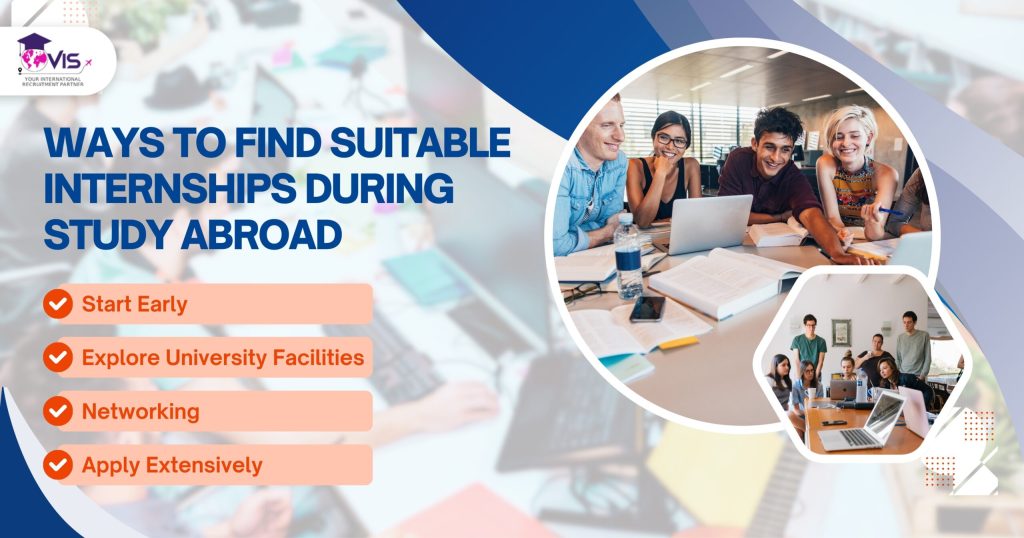How to Get Internships While Studying Abroad: A Complete 2026 Guide
Studying abroad offers incredible opportunities for academic growth, cultural experiences, and personal development. However, one of the most valuable aspects of international study is gaining professional experience through internships. Securing an internship while studying abroad not only enhances your resume but also provides real-world exposure, networking opportunities, and often a pathway to employment after graduation.
In 2026, the competition for internships among international students has increased, and companies are looking for candidates who are proactive, well-prepared, and culturally adaptable. This guide will take you step-by-step through how to get internships while studying abroad, from preparation to application and securing your position.

Step 1: Understand the Importance of Internships Abroad
Before diving into strategies, it’s essential to recognize why internships are vital for international students:
- Professional Experience: Employers value hands-on experience that complements your academic knowledge.
- Networking Opportunities: Internships help you build professional connections, which can lead to job offers or mentorship.
- Skill Development: You gain practical skills, such as teamwork, project management, and communication in a global context.
- Cultural Adaptation: Internships help you understand workplace culture in another country, which is critical for your career growth.
Pro Tip: Many students overlook internships during study abroad, focusing only on academics. Remember, internships can be your gateway to a competitive global career.
Step 2: Know Your Internship Eligibility
Eligibility rules differ based on country, institution, and visa regulations. Before applying:
- Check if your student visa allows work or internships. Some countries have strict limits on work hours.
- Determine if the internship is paid or unpaid. Some countries restrict paid internships to certain visa holders.
- Verify if academic credit can be earned for the internship. Universities often require formal approval.
Visa Considerations (2026 Updates)
- USA (F-1 Visa): You may be eligible for CPT (Curricular Practical Training) or OPT (Optional Practical Training).
- UK: Student visa allows up to 20 hours per week during term and full-time during breaks.
- Australia: Student visa allows 40 hours per fortnight during study periods.
- Canada: Co-op or work-integrated learning is permitted with study permit approval.
Tip: Check with your university’s international office to ensure compliance with visa regulations.
Step 3: Prepare a Competitive Resume and Cover Letter
Employers abroad often have different expectations than in your home country. Your resume and cover letter must be tailored for international applications.
Resume Tips:
- Use a professional format: clear headings, concise bullet points, one-page for undergraduates, two-page for graduates.
- Highlight relevant coursework, projects, and skills.
- Emphasize language proficiency if applicable.
- Include international experience or cultural adaptability.
Cover Letter Tips:
- Personalize each application for the company and role.
- Explain why you are interested in working in that country.
- Show enthusiasm for learning and adapting to a global work environment.
Pro Tip: Many companies use automated tracking systems (ATS). Include keywords from the internship description in your resume and cover letter to improve visibility.
Step 4: Start Networking Early
Networking is one of the most effective ways to secure internships abroad.
- University Career Services: Attend job fairs, workshops, and career events. Many universities partner with international companies.
- LinkedIn: Connect with alumni, recruiters, and industry professionals in your host country. Join groups related to your field.
- Professional Associations: Many fields, such as engineering, business, or IT, have international associations offering internship listings.
- Faculty Connections: Professors often know companies looking for interns and can provide referrals.
Pro Tip: Networking isn’t just online. Attend seminars, workshops, and local professional meetups to make meaningful connections.
Step 5: Identify Internship Opportunities
There are multiple ways to find internships while studying abroad:
1. University Career Portals
Most universities maintain internship boards with local and international opportunities.
2. Online Job Portals
- Glassdoor
- Indeed
- Internshala (for some regions)
- GoAbroad.com (international student focus)
3. Company Websites
Identify companies in your field and check their careers page. Many offer structured student programs.
4. Recruitment Agencies
Some countries have agencies that help international students secure internships. Check reviews and legitimacy before applying.
5. Alumni Networks
Alumni can offer insider tips, refer you to openings, and mentor you through the application process.

Step 6: Tailor Your Applications for the Local Market
Employers abroad may have expectations different from those in your home country. Research is key:
- Understand cultural norms: For example, in some countries, brevity is valued in resumes, while in others, a detailed approach works better.
- Highlight transferable skills: Teamwork, communication, adaptability, and problem-solving are universally valued.
- Show local awareness: Mention your interest in the country, its market, and your willingness to learn.
Tip: Avoid generic applications. Personalization shows dedication and increases your chances of selection.
Step 7: Prepare for Interviews
Interview styles vary internationally. Common formats include:
- Video interviews: Widely used for initial screenings.
- In-person interviews: Standard for final rounds.
- Assessment tests: Some companies require aptitude or technical tests.
Interview Preparation Tips:
- Practice common questions in your field.
- Research the company culture, products, and industry trends.
- Prepare examples of your achievements using the STAR method (Situation, Task, Action, Result).
- Dress professionally, keeping local norms in mind.
Pro Tip: For video interviews, ensure your background, lighting, and internet connection are professional.
Step 8: Consider Paid vs. Unpaid Internships
While paid internships are ideal, unpaid ones can also be valuable:
- Paid Internships: Offer financial support and sometimes lead to full-time positions.
- Unpaid Internships: Focus on skill development, networking, and experience. May be accepted for academic credit.
Pro Tip: Evaluate unpaid internships carefully. Ensure the experience gained is worth your time and aligns with your career goals.
Step 9: Make the Most of Your Internship
Once you secure an internship:
- Set Clear Goals: Identify what skills you want to gain and what projects you want to contribute to.
- Engage Actively: Ask questions, volunteer for tasks, and seek feedback.
- Network Internally: Build relationships with colleagues and supervisors.
- Document Achievements: Keep records of projects and accomplishments for future resumes.
- Respect Workplace Culture: Observe local norms, communication styles, and professional etiquette.
Tip: Your internship can be a stepping stone to a job offer. Treat it like a full-time professional role.

Step 10: Leverage Your Internship for Career Growth
After completing your internship:
- Request a recommendation letter from your supervisor.
- Add your experience to your resume and LinkedIn profile.
- Keep in touch with professional contacts. Networking can lead to future opportunities.
- Reflect on your experience to identify your career interests and skills.
Common Challenges for International Students in 2026
- Visa Restrictions: Some countries limit work hours or require special authorization.
- Competition: Internships abroad can be highly competitive. Start applications early.
- Cultural Differences: Communication styles, workplace expectations, and social norms may vary.
- Financial Constraints: Some internships may be unpaid, requiring careful budgeting.
- Language Barriers: Proficiency in the local language can be crucial for some roles.
Tip: Planning, preparation, and persistence are key to overcoming these challenges.
Bonus Tips for Success
- Start searching 6–12 months before you want to start your internship.
- Attend workshops on resume writing, interview skills, and networking offered by universities.
- Be flexible: Consider remote internships, shorter durations, or smaller companies to gain experience.
- Document and share your internship experiences on LinkedIn or a personal portfolio.
- Stay organized with application deadlines, follow-ups, and interview schedules.
Conclusion
Getting internships while studying abroad in 2026 is a highly rewarding endeavor that requires strategic planning, proactive networking, and dedication. By understanding visa regulations, preparing competitive applications, leveraging university resources, and engaging actively in your chosen internship, you can gain invaluable international work experience.